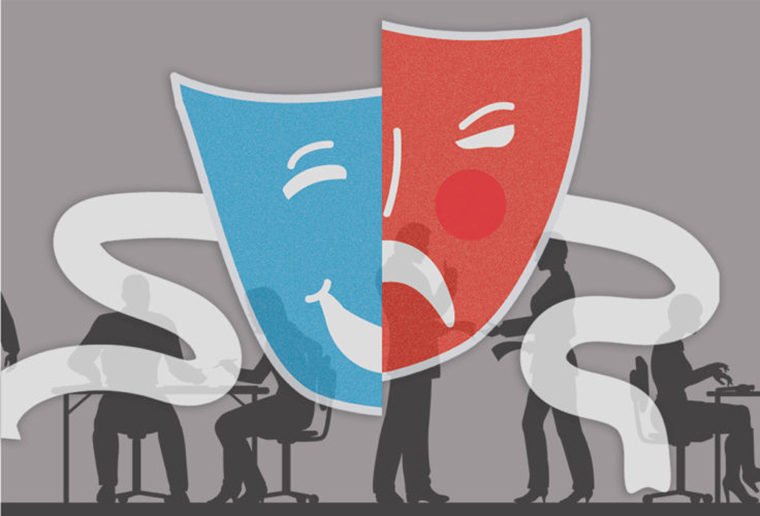You might expect that a boss who cracks jokes is healthy for the workplace, while a boss who blows his or her stack isn’t. As it turns out, the opposite might be true — depending on the circumstances.
The conclusions come from two new research papers by overlapping international research teams involving Washington University in St. Louis’ Zhenyu Liao, a postdoctoral research associate in organizational behavior at Olin Business School.

In one paper, Liao and his colleagues examined the benefits of a sense of humor among corporate leaders and concluded that a jokester in the big chair can be a mixed blessing.
Yes, humor can motivate and engage employees; plenty of research says so. But Liao and his colleagues found that, in some cases, the boss’s humor can create a climate ripe for rule-breakers.
On the other side of the coin, the second research paper examined what happens after a boss blows up in front of her or his subordinates. The short answer: Most try to make nice later on. “The leaders often use a more indirect way of expressing their apology,” Liao said.
Breaking you up means breaking the rules
In their paper on boss humor in the workplace, Liao and colleagues pose a question: “What do dinosaurs and decent lawyers have in common?” It’s the only joke they offer in their paper, “The Mixed Blessing of Leader Sense of Humor: Examining Costs and Benefits,” published in the Academy of Management Journal.
The punchline: “They’re both extinct.” The joke illustrates a psychological framework for humor known as “benign violation theory” — a framework the researchers apply to the workplace for the first time.
As the theory goes, certain types of humor require a “violation of norms” (Ha! All good lawyers are dead!). Second, the violation must be “benign” (Nobody really thinks all good lawyers are dead). Third, the violation and its “benign nature” occur together.
A leader who issues a steady drumbeat of ‘benign violations’ through his or her humor can inadvertently communicate that other violations are acceptable — insulting coworkers, violating nondisclosure agreements or fudging on financial reports.
But a leader who issues a steady drumbeat of “benign violations” through his or her humor can inadvertently communicate to subordinates that other violations are acceptable — swiping office supplies, insulting coworkers, even violating nondisclosure agreements or fudging on financial reports.
“You’re sending out signals implicitly telling your employees it’s OK to violate some norms,” Liao said. What’s worse: Bosses who use “aggressive humor”— put-downs, insults and sarcasm — exacerbate the bad and undermine the benefits of office humor.
The researchers drew the conclusions from a series of surveys, first on more than 200 MBA students in China, then on 200 U.S. workers mostly in banking, sales and engineering. Liao began his work on the paper as a PhD student with lead author Kai Chi Yam at National University of Singapore. Researchers at the University of North Carolina, Wuhan University and Singapore Management University also contributed.
“We’re not trying to say leaders should not engage in humor,” Liao said. “They should be more mindful about their humor. Your role, your status — all of your actions — will send out very strong signals about what behaviors are acceptable.”
Cleansing the air after an angry outburst
Liao’s research into the results of a boss’s angry outbursts grew from his own experience with bosses who embarrassed or belittled him publicly, only to privately circle back as a more nurturing workplace partner. The study was highlighted in the April 4 Harvard Business Review.
“Cleansing My Abuse: A Reparative Response Model of Perpetrating Abusive Supervisor Behavior,” accepted by and soon-to-be published in the Journal of Applied Psychology, also relied on the results of a pair of surveys reaching a total of 99 leaders and 140 subordinates. Over a period of time, workers gauged their experience either receiving or doling out abusive behavior — and what behavior followed the abuse.
The authors concluded that “morally attentive” leaders who have high “moral courage” try to “cleanse” their guilt by later offering offended subordinates interesting work assignments, career-building advice, more personal attention, or more work resources.
“When you realize you are engaging in this kind of behavior, maybe you realize you shouldn’t,” Liao said. “You may feel like you want to engage in some sort of cleansing behavior.”
He noted that this isn’t about a boss’s leadership style. Instead, it’s about a specific type of behavior on a particular day. Maybe the boss was just having a bad day.
“We highlight that seemingly incompatible leadership behaviors can exist within the same leaders, shedding light on paradoxical leadership patterns,” the researchers wrote.



